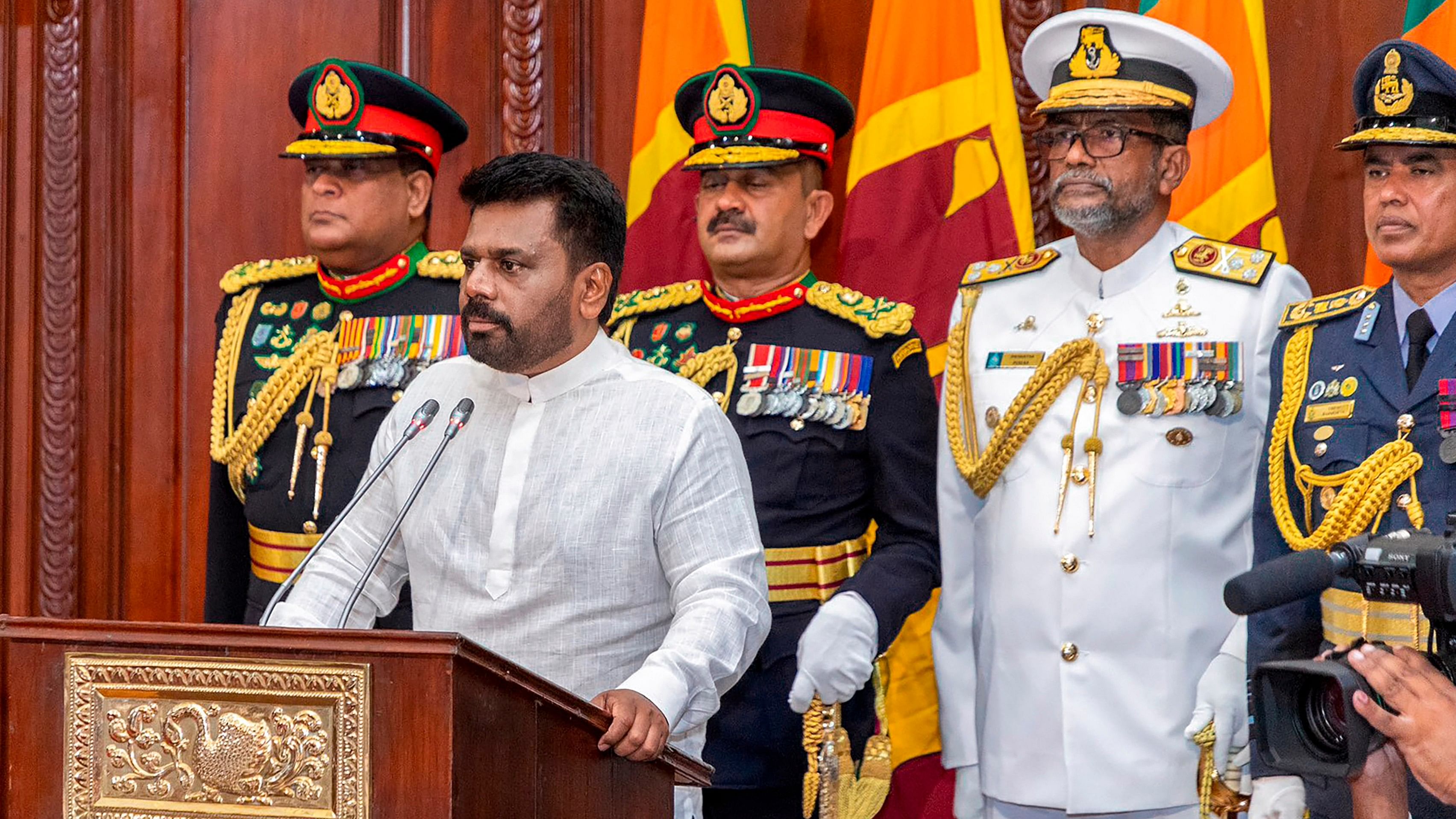
Anura Kumara Dissanayake.
Credit: X/@anuradisanayake
By Mihir Sharma
Sri Lanka has a new president in nationalist outsider Anura Kumara Dissanayake. His victory is a testament to the vitality of the country’s democracy: Two years after demonstrators forced the resignation of the island’s president and prime minister, protest leader Dissanayake prevailed against two well-connected centrists.
For regional behemoth India, however, the results cap a troubling trend. Dissanayake has worried New Delhi because his party, the Janatha Vimukthi Peramuna, made a name for itself in the 1980s with an anti-India terror campaign. While the new president has tried to mend fences, including during a visit earlier this year, India will consider him a poor exchange for his predecessor, Ranil Wickremesinghe, who was distrustful of China and supportive of Indian investment.
Similar political transitions have transformed South Asia. Just last month, Bangladesh’s long-serving prime minister, Sheikh Hasina, was overthrown and fled to India for refuge. Earlier in the summer, K.P. Sharma Oli, who has always been close to Beijing, returned as Nepal’s prime minister.
An “India out” campaign in the Maldives swept its current president, Mohamed Muizzu, to power in 2023. And it’s likely Indian officials would prefer that Imran Khan, who remains wildly popular with the Pakistani electorate, stays in the jail where most believe his country’s military has put him.
New Delhi began the year secure in its relationships with Kathmandu, Dhaka, and Colombo; the only neighbour it can now mostly count on is the tiny monarchy of Bhutan — a decades-old treaty ally that manages its security and foreign policy in close cooperation with India.
While internal developments obviously drove most of these political transitions, Indian policy has done the country no favors. While Indians like to remind people that theirs is the world’s largest democracy, their neighbours complain that New Delhi doesn’t always promote and support democratic values in the region.
Indeed, pro-government commentators openly boast that India’s foreign policy has succeeded by “shaping democratic verdicts” in its neighbourhood and “turning a blind eye to democratic deficits.”
Sometimes, though, realpolitik is just short-sightedness. Hasina’s exit in Bangladesh followed elections a few months earlier that most — including the US — did not view as free and fair. India overlooked that and appeared taken by surprise when she turned out to be massively unpopular after all.
Similarly, New Delhi’s courting of the military junta in Myanmar — which memorably led then-US President Barack Obama to upbraid India’s parliament in 2010 for “shying away” from the defense of democracy — might soon turn sour. Indian officials were incensed at the time, insisting that the strong hand of the Burmese military was needed to manage the volatile border. Now anti-government rebels control large parts of that same frontier, making ties to the junta more of a liability than an asset.
It didn’t have to be this way. When Prime Minister Narendra Modi was first elected in 2014, he invited leaders of neighboring nations to his swearing-in. He had an opportunity to reset relations with all of them and to create new partnerships based on economic integration and mutual respect for democracy.
In the years since, diplomats ceded control of relations with those countries — and with China, with whom India shares the longest of its borders — to the security establishment. That has turned out to be a crucial mistake. If you see your neighbors primarily through a security lens, you risk picking allies and condoning behavior that together alienate large swathes of the electorate. When political winds shift, such bets can turn rapidly.
You might think that India’s extraordinary soft power would make up for some of these missteps. But the influence of its movies and media, which are followed closely across South Asia, can be unhelpful. After the Maldives election, popular Bollywood stars declared they would stop vacationing there. And the hyper-nationalist news media focuses relentlessly on stories that citizens of these smaller neighbors feel portray their countries unfairly.
India would be wise to study China’s relations with its neighbors. That would give policymakers some idea of what not to do, as well as what might work. Economic integration is essential: As the region’s biggest market, India needs to be a source of prosperity for its denizens.
On the other hand, expecting smaller countries to kowtow is a mistake. India’s rise might be as inevitable as China’s. Neither would-be superpower, though, can afford to ignore the aspirations of its neighbors.